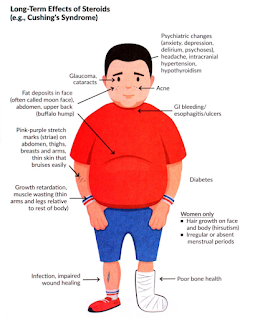Cushing Syndrome
Introduction
Cushing syndrome refers to the signs and symptoms that result from excess cortisol.
- Initial screening tests for Cushing syndrome include the 1 mg overnight dexamethasone suppression test, and measurements of free cortisol (24-hour urinary cortisol and late-night salivary cortisol).
Symptoms
Symptoms include central obesity, facial puffiness or roundness, peripheral oedema, thinning of the skin, and weakness, as well as complications such as diabetes, elevated blood pressure, dyslipidaemia and osteoporosis.
- In children, cortisol excess can also cause growth failure and delay of maturation (except in children with coincident androgen excess).
Management
Treatment should be directed, whenever possible, at the primary cause of the syndrome.
Cushing syndrome can be caused by
- Exogenous administration of glucocorticoids
- Endogenous production of cortisol by an adrenal adenoma or carcinoma
- Bilateral nodular adrenal hyperplasia (rare)
- Overstimulation of both adrenal glands by excess adrenocorticotrophic hormone (ACTH) production from a pituitary adenoma (Cushing disease) or an ectopic ACTH-producing tumour.

Comments
Post a Comment